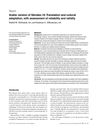The Magnitude of Skin Disease in the United States
April 2000
in “
Dermatologic Clinics
”

TLDR Skin diseases, especially psoriasis, greatly affect people's quality of life, similar to chronic diseases.
In 1997, skin diseases accounted for 65.7 million outpatient visits in the United States, which was 8.7% of all outpatient care. Dermatologists managed 38.3% of these visits, and primary care physicians saw 42.4%. The majority of patients were White (87%), with Black (9.1%), Asian/Pacific Islander (3.4%), American Indian/Eskimo/Aleut (0.6%), and Hispanic (5.4%) patients also seeking care. Dermatitides were the most common diagnosis among the top ten dermatologic conditions, which made up 44.3% of visits. Skin diseases, especially psoriasis, significantly impacted Health-Related Quality of Life (HRQL), affecting physical, psychological, social, vocational, and leisure aspects of life. Psoriasis was associated with functional impairment, disability, and an increased risk for depression and anxiety. The annual cost of psoriasis care exceeded $2 billion. Studies showed that psoriasis could negatively affect HRQL comparably to serious medical conditions like cardiac failure, angina, and hypertension. One study found that psoriasis patients had worse HRQL scores on all ten SF-36 subscales compared to the general population, with particularly poor physical well-being, except for those with congestive heart failure, and mental well-being scores lower than all but those with depression and chronic lung disease. The document concludes that skin diseases, particularly psoriasis, have a substantial impact on quality of life, similar to other chronic illnesses.





